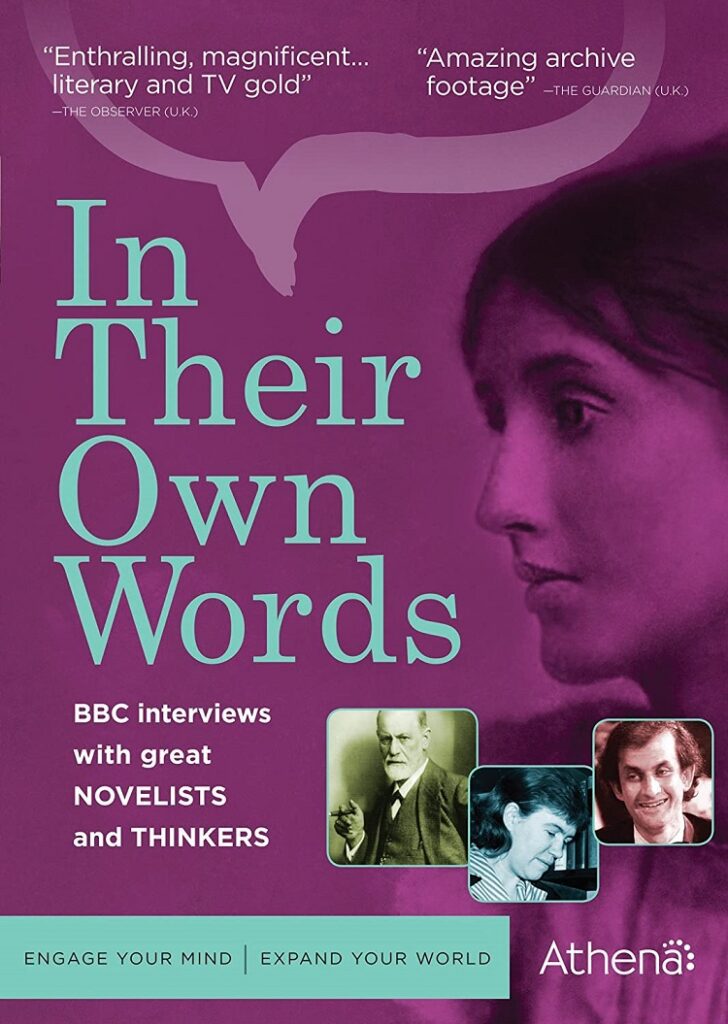
Athena’s In Their Own Words two-DVD set collects a pair of BBC Four television series of the same. The production teams thoroughly combed the BBC Archives to present interviews with the best and brightest minds of the 20th Century. Each episode runs under an hour and puts the spotlight on at least 10 people, allowing for brief introductions to them and their works with commentary from modern-day pundits.
Disc One features the three-part series, British Novelists, which first aired in August 2010. Through the episodes, the viewer learns “the story of the 20th Century British novel as told by the writers themselves.” Episode One is titled “Among the Ruins 1919-1939” and opens with Great Britain coming out of The First War and ends while in the middle of the Second. Virginia Woolf appears by way of her only known audio recording and George Orwell is only seen. Some authors offered escape to the past, such as Robert Graves with I, Claudius and T.H. White with The Sword in the Stone. Evelyn Waugh is amusingly cantankerous, claiming Ulysses is where James Joyce’s madness sets in and Finnegan’s Wake is gibberish.
Episode Two is “The Age of Anxiety 1945-1969” named after a Pulitzer Prize-winning poem by W.H. Auden. It looks at how the British novel was reinvented in the post-War years. Quite a number of genre titles reveal writers of great talent and popularity, such as J.R.R. Tolkein’s The Lord of the Rings fantasy trilogy and spy thrillers by Ian Fleming and John Le Carre. Science fiction was used to examine mankind in John Wyndham’s The Day of the Triffids, Anthony Burgess’ A Clockwork Orange and the work of JG Ballard, who saw the modern world becoming an alien place. The novels of West Indian immigrant George Lamming and women like Doris Lessing and Margaret Drabble offered new perspectives.
Episode Three is “Nothing Sacred 1970-1990” and finds authors challenging institutions, even literary ones. Feminists Fay Weldon and Angela Carter responded to the patriarchal society while Martin Amis was one of many who reacted against Thatcher’s policies. The episode concludes with the fall of Berlin Wall and the fatwa being issued against Salman Rushdie for The Satanic Verses, which some Muslims considered blasphemous.
Text biographies of Woolf, Tolkien, Aldous Huxley, Orwell, Graham Greene, and Rushdie are included on the disc.
The following year, a three-part series focusing on the Great Thinkers aired. “Human, All Too Human” examines those who examined humans, from psychologists like Sigmund Freud, who is heard through an audio recording and is seen in home movies; Carl Jung, who states “the only real danger that exists is man himself”; and Stanley Milgrim who famous experiment had shocking results. Other highlights reveal what was learned when Margaret Mead observed Samoan adolescents, when Jane Goodall observed chimpanzees, and when Desmond Morris observed humans as animals. Some didn’t care for the latter as it diminished the importance of humans, so you may imagine how they reacted when Richard Dawkins thought humans should be viewed by their selfish genes.
Named after John Maynard Keynes theory regarding the government spending to solve unemployment, Episode 2 “The Grand Experiment” features political and economic thinkers who had ideals about society. Those who disagreed with Keynes also appear like Friedrich Hayek, who thought the free market should be left to its own devices. His book The Road to Serfdom was written in 1944 and its ideas resurfaced in ’70s. Herbert Marchuse, author of wrote One-Dimensional Man took a different view and felt consumerist society stifled democracy and liberty. I particularly enjoyed this episode because it presented the societal upheaval that took place during the ’60s through a different perspective than the American one that is so often shown. It turns out racism, sexism, and being against the Vietnam War were global issues.
Episode 3 is “The Culture Wars”. It opens with John Reith, who shaped the BBC and caused it to be an important element in the lives of the masses. F.R. Leavis believed there needed to be an educated elite to preserve English literature. Richard Hoggart explores the overlooked culture of commoners, showing culture was not restricted to elite endeavors, such as literature and opera. What culture was viewed as shifted to be what all classes enjoyed.
Text biographies of Freud, Bertrand Russell, Keynes, Mead, Susan Sontag, Goodall, and Edward Said are included on the disc.
While In Their Own Words is fascinating and a great treat for history buffs, there is only so much to be learned under the time constraints, causing the series to come across like a video version of Cliffs Notes. While I may or may not test well on the work and ideas of all those involved after one viewing, the series certainly makes for a great introduction to these people and will send me off to do further study on my own.